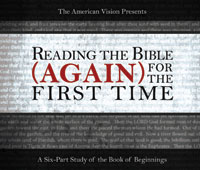Apr
8
2009
Passover was not a sign of salvation, but of coming salvation. Passover constituted Israel a “peculiar” people, particularly redeemed by God, and given a special priestly task. How were the gentiles related to Passover? By watching it, and putting faith in it. Someday, according to the promise of the covenant, they would be let in the House. For now, they were to stand at the doors and windows and look in. They watched the peculiar people eat the Passover, and they trusted that God would save them as well. They watched the peculiar priestly people circumcise their children, and they trusted that the benefits of that act were theirs as well.
Continue reading
Comments Off | tags: James Jordan, Passover | posted in Biblical Theology
Apr
8
2009
Claims of apostolic succession by themselves, then, are not only meaningless, they can easily become idolatrous, substituting temporal continuity for the discontinuous new-creating work of the Spirit. According to the Creed, only the Spirit is the “Lord and Giver of life.”
Thus, we should not be surprised when it turns out to be relatively new churches that are the true heirs of the wealth of the past. It is what we should expect, when we realize that our God “makes all things new.”
James B. Jordan, The Sociology of the Church, p. 132.
Download PDF here.
Institutionally, the Roman church is a memorial to the dividing, life-preserving judgment of God. It is an empty cicada shell, now gold-plated by men to cover the word Ichabod engraved on its forehead. And all churches are subject to such assessment.
Comments Off | tags: Church History, James Jordan | posted in Quotes
Apr
8
2009
One of the best ways to communicate truth in such a way as to grip the hearts and minds of the hearer is by means of story telling. The Bible is full of stories, designed for just this purpose. The whole theology of story telling could use a treatment in itself…
God is Himself the Great Story Teller. Being God, He can sovereignly superintend all events so as to bring His stories to life. His stories really happened. The fact that they are told as stories does not subtract one whit from their real historical character. Still, what gives them their thrilling power is not only that we know that they really happened in a certain year and at a certain place, but because they speak to us today.
Why do good stories speak to us today? Because, as students of literature would say, they embody universal characteristics, and deal with universal problems, hopes, fears, symbols, and so forth. This is exactly correct. Universal truths are not the same as abstract generalities, however. It is precisely in the specific events themselves that the most universal aspects of the stories are seen.
James B. Jordan, Judges: God’s War Against Humanism, p.ix
http://www.biblicalhorizons.com/pdf/jjju.pdf
Comments Off | tags: James Jordan, Judges | posted in Biblical Theology
Apr
8
2009
Judges, like all the so-called “history books” of the Old Testament, is really a prophecy. Judges is numbered among what are called the “Former Prophets.” These books were called prophecies because the histories they  recorded were regarded as exemplary. The histories showed God’s principles in action, and thus formed prophetic warnings to the people. If we read Judges merely as a set of exciting stories, we miss this.
recorded were regarded as exemplary. The histories showed God’s principles in action, and thus formed prophetic warnings to the people. If we read Judges merely as a set of exciting stories, we miss this.
To get at the prophetic meaning, we need to know four “secrets” of interpreting Biblical narratives. First, we have to take seriously the universals, as mentioned above. The first enemy who invades Israel in the book of Judges is Cushan-of-Double-Wickedness from Aram-of-Double-River. This is Mesopotamia. What is the prophecy? If the people do not live righteously, the enemy will come from Mesopotamia. And so it was. First Assyria conquered Northern Israel, and later Babylon conquered Southern Israel, so that even the idea of a two-fold destruction came to pass.
James B. Jordan, Judges: God’s War Against Humanism, p.xi
http://www.biblicalhorizons.com/pdf/jjju.pdf
Comments Off | tags: James Jordan, Judges | posted in Biblical Theology
Apr
8
2009
Originally posted 27 September 2008
Rev Dr Malcolm Brown papers over the Grand Canyon at
http://www.cofe.anglican.org/darwin/malcolmbrown.html
and CMI critiques his article at
Church of England apologises to Darwin
Anglican Church’s neo-Chamberlainite appeasement of secularism
http://creationontheweb.com/content/view/6048
“… it is important to recognise that the anti-evolutionary fervour in some corners of the churches may be… an indictment of the churches’ failure to tell their own story – Jesus’s story – with conviction in a way which works with the grain of the world as God has revealed it to be, both through the Bible and in the work of scientists of Darwin’s calibre.”
Rev Dr Malcolm Brown (who looks like a nice man) surely must understand that the philosophy of evolution is exactly the reason for the decline of Christianity in the west, and the rejection of what he calls Jesus’ ‘story.’ It contradicts at a very fundamental level both the Old Testament and the obvious beliefs of Jesus Himself. A child can see that. I recommend the critique of Brown’s article and would be interested to see Brown’s response. Continue reading
Comments Off | tags: Atheism, Compromise, Genesis, Gnosticism, Ideology, James Jordan | posted in Creation
Apr
8
2009
 Higher criticism’s rejection of the Bible’s chronology (followed by much of evangelicalism) robs Christians of some amazing facts. According to James Jordan, Joseph was sold by his brothers before the birth of Benjamin, and Isaac (the sacrifice) died a year before Joseph’s release from prison.
Higher criticism’s rejection of the Bible’s chronology (followed by much of evangelicalism) robs Christians of some amazing facts. According to James Jordan, Joseph was sold by his brothers before the birth of Benjamin, and Isaac (the sacrifice) died a year before Joseph’s release from prison.
James B. Jordan, Reading the Bible (again) for the First Time (Audio series).
Comments Off | tags: Bible Chronology, James Jordan | posted in Biblical Theology
Apr
8
2009
“The French Revolution caused many Protestants to begin to consider whether there might be evils even worse than Roman Catholicism. Once it was clear that history had moved beyond the Papacy, many commentators shifted to a futurist approach to prophecy. They continued to roll all the bad characters in the Bible into one evil personage, this time not the Pope but some “Antichrist” who would appear in the future just before Jesus returns.
Few of these expositors seem to be able to resist the temptation to suggest, if not insist, that this “Antichrist” is due to appear shortly after their commentary is published. In this way, cultural bigotry has continued to inform most advocates of the futurist approach: The decline of European-American (nowadays called “Western”) civilization is identified as the final decline of Christendom and as a sign of the “last days.” The rest of the world does not count. Events in the Middle East and Europe are identified with Biblical prophecy and accorded status as signs of the end of the world. That this approach relegates the red, brown, black, and yellow peoples of the world to the status of historical non-entities does not seem to be noticed by the advocates of this unintentionally racist approach to predictive prophecy.”
James B. Jordan, The Handwriting on the Wall, p. 4.
Comments Off | tags: Dispensationalism, James Jordan | posted in Biblical Theology
Apr
8
2009
“To try to generate good Church music out of the meager vocabulary of American popular music is like trying to generate good theology out of the ideas heard on Christian radio and television.”
–James B. Jordan, Symbolism: A Manifesto
Comments Off | tags: James Jordan, Music | posted in Quotes
Apr
8
2009
by Uri Brito
James Jordan makes some interesting remarks concerning scientific methods and the questions posed by science. [1] According to Jordan, modern scientific assumptions about the present betray the past and an accurate approach to the future. Science assumes that what we have today (referring to scientific discoveries) is exactly as it was in the past. However, scientific questions posed today are vastly different than the ones posed one hundred years ago. What Jordan is questioning with this reasoning is that science cannot be certain of its claims in the present, hence it must be seen with skepticism and understood for its limitations. When scientists claim certainty in their methods, they are in essence claiming ignorance of the lessons of the past and the future. Jordan writes:
The point of all of this is that the past is not subject to the kinds of controls and observation that science requires. Interpreting the past involves guesswork to a far greater degree than observational science, and thus there is far more room for presuppositions and assumptions to play a role. [2]
Jordan argues that unbelievers invariably are prone to wander in their scientific endeavors. Hence, “unbelieving ‘science’ does not perceive the true nature of the universe.” [3] Their worldviews restrain them from seeing biblical truth exchanging it for a lie. Jordan concludes that “when Christians operate on the same premises as unbelievers, they will not perceive aright either.” [4] Is it any wonder that natural theologians have begun to deny the historicity of the Creation account?
Jordan makes one further assertion worthy of consideration. He argues that Matthew 13 provides an excellent example of the intention of the Biblical record. According to our Lord, the parables were meant to reveal truth to believers and to deceive unbelievers. Jordan draws a similar parallel to revelation in creation. “If creational revelation is truly revelation, then it partakes of this same parabolic nature.” [5] As the written word misleads the faithless, so does the natural Word. Any approach that seeks to dispel the account of the Scripture is prone to self-deception.
___________________________
[1] James B. Jordan, Chapter 6, Creation in Six Days: A Defense of the Traditional Reading of Genesis One
[2-4] Jordan, p. 126
[5] Jordan, p. 127
Comments Off | tags: Biblical worldview, James Jordan, Uri Brito | posted in Creation, Quotes
Apr
8
2009

“The Kingdom of God is not advanced through politics and ideology, but through proclamation and charity.”
–James B. Jordan
Comments Off | tags: Gnosticism, Ideology, James Jordan | posted in Quotes



























